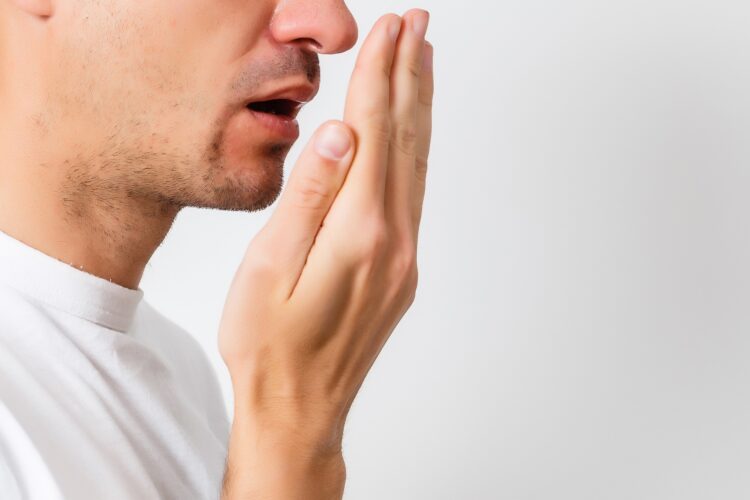Waking up to an unpleasant taste or smell in your mouth can ruin the start of your day. This common issue stems from a mix of natural processes that occur while we sleep and a few habits that might worsen the situation. Let’s break it down and explore how you can tackle it effectively for a fresher, more confident start every day.
Table of Contents
Key Points
- Saliva production slows during sleep, allowing bacteria to grow.
- Certain foods like garlic and dairy can linger and cause unpleasant odors.
- Proper oral care routines significantly reduce bad breath.
- Dehydration increases dryness, worsening overnight smells.
- Diet, hygiene, and lifestyle habits all contribute to oral health.
The Quiet Role of Saliva

Saliva acts as your body’s natural defense against bad smells. It flushes out food particles, neutralizes bacteria, and prevents dryness in your mouth. During the night, saliva production slows down. This allows bacteria to thrive, leading to the creation of volatile sulfur compounds, which are the primary cause of bad breath.
Think of saliva as your mouth’s personal cleaning crew—when the crew takes a break at night, messes pile up. Staying hydrated and chewing sugar-free gum during the day encourages saliva flow, helping to combat this natural slowdown.
What Triggers Morning Odors?
Morning odors don’t arise out of nowhere. Several factors play a role, and most of them are easy to address with small changes:
- Bacterial Activity
Bacteria feast on leftover food particles in your mouth, producing sulfur compounds. When saliva dries up, the bacteria have free rein. - Dietary Choices
Foods like garlic, onions, and spicy meals leave strong residues that linger. Eating these in the evening increases the chance of waking up with an unpleasant taste or smell. - Tobacco Use
Tobacco products dry out your mouth, reduce saliva production, and introduce additional chemicals that make odors worse. - Inconsistent Oral Hygiene
Skipping a thorough nighttime brushing allows bacteria to feed overnight, worsening the situation by morning.
How Dehydration Impacts Oral Freshness

Dehydration plays a major role in overnight dryness. Without enough water in your system, your mouth can’t produce adequate saliva. This leads to an environment where bacteria multiply rapidly.
Combat dehydration by drinking enough water throughout the day. Avoid excessive caffeine and alcohol in the evening, as they contribute to dryness. Carry a reusable water bottle to make hydrating more convenient.
Portable solutions like mouthwatering mints can come to your rescue when brushing isn’t an option. These handy mints not only leave your breath fresh but also keep your mouth hydrated. Unlike regular mints, they are designed to stimulate saliva production, which makes them an excellent tool for fighting bacteria.
The Science of Smelly Compounds
The odors in your mouth come down to science. Bacteria release volatile sulfur compounds (VSCs) as they break down proteins left behind by food. These compounds are responsible for unpleasant smells.
The main offenders are:
- Hydrogen Sulfide: The smell of rotten eggs.
- Methyl Mercaptan: Found in certain cheeses and also linked to smelly socks.
- Dimethyl Sulfide: A more subtle odor that still contributes to the issue.
Using toothpaste or mouthwash designed to neutralize VSCs can greatly reduce the impact of these compounds.
Foods That Worsen Morning Odors
Certain foods are notorious for making overnight smells worse. To avoid waking up with a bad taste, steer clear of:
- Garlic and Onions: Their strong compounds stay in your bloodstream and can resurface hours after eating.
- Dairy Products: Proteins in dairy are broken down by bacteria, creating a sour smell.
- Sugary Snacks: Sugar feeds bacteria, giving them more fuel to produce odors.
Instead, opt for crunchy fruits and vegetables like apples and carrots before bed. These naturally clean your teeth while adding nutrients to your diet.
A Look at Natural Remedies
Nature offers simple solutions to combat bad odors. Here are a few options to consider:
- Green Tea: Rich in antioxidants, it reduces bacterial activity.
- Parsley or Mint: Chewing on fresh leaves neutralizes strong odors.
- Probiotic Yogurt: Balances bacteria in your gut and mouth, reducing odor-causing bacteria.
- Baking Soda Rinse: Neutralizes acids in your mouth and reduces bacteria.
These remedies work best as a supplement to a solid oral hygiene routine.
Can Stress Cause Bad Odors?

Stress doesn’t just weigh on your mind; it affects your mouth, too. It can lead to habits like teeth grinding or clenching, which create small cracks where bacteria hide. Stress also reduces saliva flow, creating a drier mouth.
Incorporate stress-relief techniques like meditation or breathing exercises to support your oral health. A calm mind often leads to a healthier body and fresher mouth.
Boosting Your Hygiene Routine
A proper oral care routine is your best defense. Consider adding the following habits:
- Tongue Scraping: The tongue harbors a large portion of odor-causing bacteria. Use a scraper to remove the buildup.
- Flossing: Flossing gets rid of food stuck between teeth, where bacteria love to hide.
- Rinsing with Mouthwash: Alcohol-free options hydrate your mouth and reduce bacterial growth.
- Brushing Before Bed: Nighttime brushing removes leftover food particles that bacteria feast on overnight.
Consistency is key. Don’t skip these steps if you want to wake up feeling fresher.
Foods That Freshen Your Mouth
Certain foods can improve your oral environment and help combat bad odors naturally.
- Cucumbers: Their high water content boosts hydration.
- Strawberries: Contain malic acid, which can whiten teeth and refresh your mouth.
- Celery Sticks: Crunchy and fibrous, they act like a natural toothbrush.
Incorporating these into your diet gives you a double benefit—healthier teeth and a fresher mouth.
Fun Facts About Oral Odors
- Did you know that kissing can reduce bad breath? Saliva exchange during a kiss increases saliva production, which washes away bacteria.
- The human tongue has its own microbiome, which contributes to individual odor variations.
- Chewing sugar-free gum after meals stimulates saliva and reduces bacteria.
Morning Smells and Social Confidence

The way you feel about your mouth affects your confidence. Imagine starting your day with a fresh, clean feeling instead of worrying about odors. Fresh breath helps you feel more at ease during conversations and close encounters, whether it’s a work meeting or a date.
Investing in portable fresheners like mouthwatering mints or making simple lifestyle adjustments can boost not only your oral health but also your overall self-esteem.
Making Freshness Part of Your Life
Freshness starts with good habits. A hydrated, clean mouth is more than just about oral health—it’s about feeling your best every day. With the right balance of hygiene, diet, and stress management, you can wake up feeling fresh and ready to face the day.
Take it one step further with mouthwatering mints, natural remedies, and foods that support a healthier oral environment. Small changes add up to big improvements.
